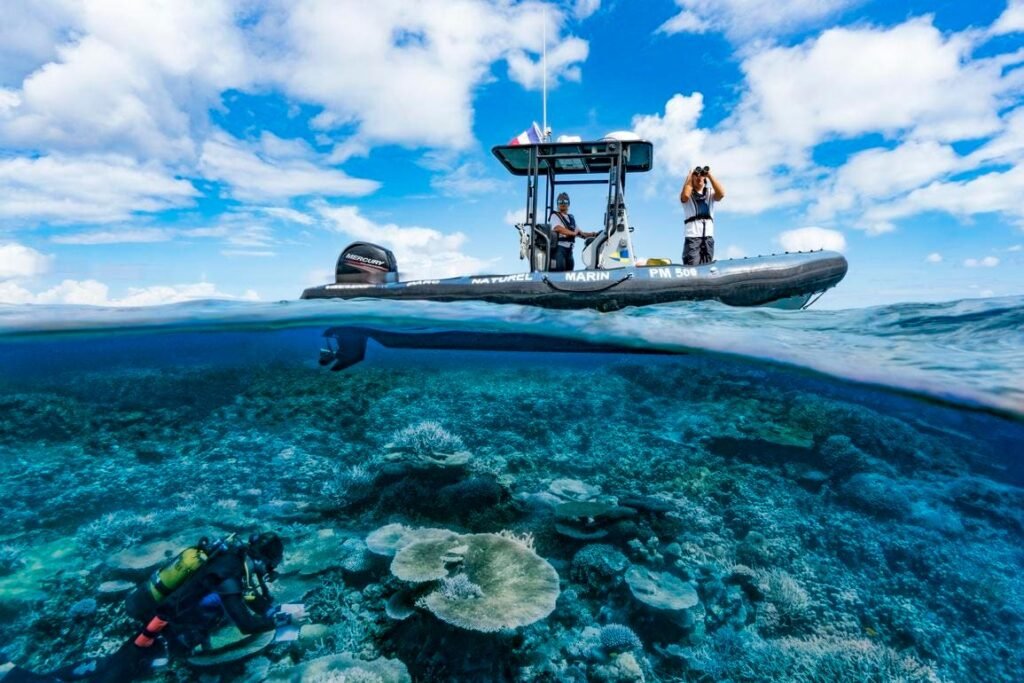Mayotte, Indian Ocean – November 2017: Divers from Mayotte Marine Natural Park conduct a coral reef survey called a reef check in Mayotte, Indian Ocean, Comoros Islands, November 27, 2017. This scientific program will make it possible to assess the health of the lagoon’s coral reefs. (Photo by Alexis Rosenfeld/Getty Images)
Getty Images
Ocean acidification is “fundamentally altering marine ecosystems” and could cause irreversible damage if left unaddressed, according to a new analysis.
A report published by the nonprofit Back to Blue’s Economist Impact ahead of next week’s UN COP16 biodiversity conference warns that there is currently a severe lack of research on ocean acidification around the world. There is.
The study found that despite concerns that the problem could have a devastating impact on marine life, food chains and economies around the world, no action plans are in place to tackle the problem. is said to be one of only 13 governments in the world.
Ocean acidification occurs when the ocean absorbs carbon dioxide from the atmosphere but cannot sequester it fast enough.
Excessive concentrations of carbon dioxide in water lowers pH levels and increases acidity in a process known as ocean acidification.
Professor Steve Widdicombe, the report’s lead author, said in an interview that ocean acidification, if left unchecked, could “fundamentally change marine ecosystems as we know them”.
Professor Widdicombe added that there were still many areas around the world where there was a “serious lack” of research into the rate and impact of ocean acidification, particularly around developing countries and small island states.
He said the effects of ocean acidification depend on its context and geography and need to be studied in the real world, not just the laboratory.
“Just because you’ve done some research in Western Europe, you don’t necessarily understand what happens in South America, Africa or the Pacific Islands,” Professor Widdicombe says.
He said research has already shown how increasing acidification affects marine organisms with shells made of calcium carbonate, such as corals, crabs, oysters and lobsters.
“Originally, it was thought that getting carbon dioxide into the ocean was actually a very good thing, because by limiting the increase in carbon dioxide in the atmosphere, it would ultimately reduce global warming. Because it can be suppressed,” he explained.
“But the problem is that carbon dioxide is entering the ocean so fast and in such large quantities that the ocean’s natural buffers can’t handle it.”
“It’s currently having a very large negative impact on the ocean system.”
Professor Widdicombe said it was important that governments incorporated ocean acidification into their environmental policies and took proactive action.
The last COP15 conference on biodiversity, held in Montreal, Canada in 2022, set 23 goals to halt biodiversity loss and restore natural ecosystems by 2030.
One of these goals includes minimizing the impact of ocean acidification on biodiversity.
The ‘Back to Blue’ study is based on interviews with scientists from UNESCO, Plymouth Marine Research Institute and the Intergovernmental Science-Policy Platform on Biodiversity and Ecosystem Services (IPBES).
Scientists will also fund a new research initiative that integrates marine biology and chemistry to better understand the role of ocean acidification in biodiversity loss and establish a causal link to species decline. He insisted.
WWF Oceans Director Pepe Clark said in a statement that climate-related loss of biodiversity in the oceans is already catastrophic.
“The more definitive data that can be collected, the more the national action plan will be based on scientific evidence,” Clark added.
“While other stressors on marine life, such as overfishing and chemical pollution, may be at the top of the political agenda, ocean acidification is quietly destroying what we rely on most. ”

